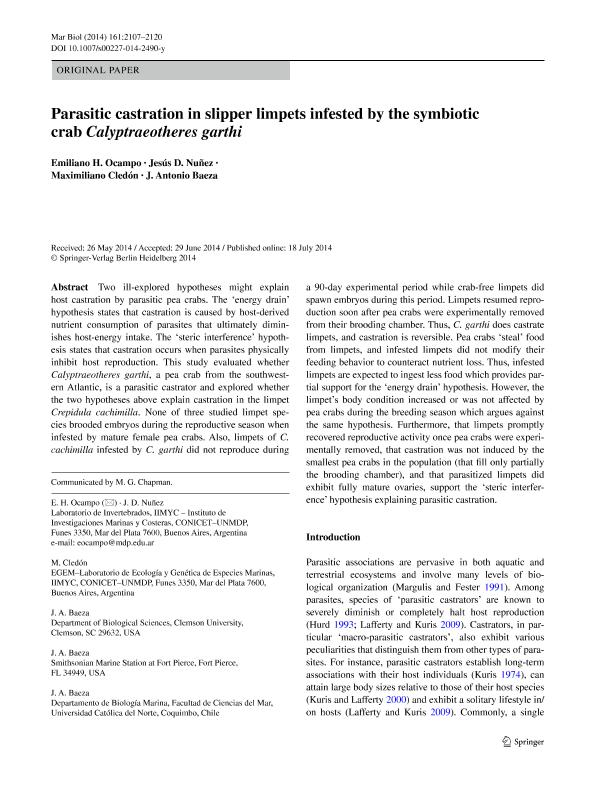Artículo
Parasitic castration in slipper limpets infested by the symbiotic crab Calyptraeotheres garthi
Fecha de publicación:
07/2014
Editorial:
Springer
Revista:
Marine Biology
ISSN:
0025-3162
Idioma:
Inglés
Tipo de recurso:
Artículo publicado
Clasificación temática:
Resumen
Two ill-explored hypotheses might explain host castration by parasitic pea crabs. The ‘energy drain’ hypothesis states that castration is caused by host-derived nutrient consumption of parasites that ultimately diminishes host-energy intake. The ‘steric interference’ hypothesis states that castration occurs when parasites physically inhibit host reproduction. This study evaluated whether Calyptraeotheres garthi, a pea crab from the southwestern Atlantic, is a parasitic castrator and explored whether the two hypotheses above explain castration in the limpet Crepidula cachimilla. None of three studied limpet species brooded embryos during the reproductive season when infested by mature female pea crabs. Also, limpets of C. cachimilla infested by C. garthi did not reproduce during a 90-day experimental period while crab-free limpets did spawn embryos during this period. Limpets resumed reproduction soon after pea crabs were experimentally removed from their brooding chamber. Thus, C. garthi does castrate limpets, and castration is reversible. Pea crabs ‘steal’ food from limpets, and infested limpets did not modify their feeding behavior to counteract nutrient loss. Thus, infested limpets are expected to ingest less food which provides partial support for the ‘energy drain’ hypothesis. However, the limpet’s body condition increased or was not affected by pea crabs during the breeding season which argues against the same hypothesis. Furthermore, that limpets promptly recovered reproductive activity once pea crabs were experimentally removed, that castration was not induced by the smallest pea crabs in the population (that fill only partially the brooding chamber), and that parasitized limpets did exhibit fully mature ovaries, support the ‘steric interference’ hypothesis explaining parasitic castration.
Palabras clave:
Steric Interference
,
Pea Crabs
,
Limpets
,
Parasitic Castration
Archivos asociados
Licencia
Identificadores
Colecciones
Articulos(IIMYC)
Articulos de INSTITUTO DE INVESTIGACIONES MARINAS Y COSTERAS
Articulos de INSTITUTO DE INVESTIGACIONES MARINAS Y COSTERAS
Citación
Ocampo, Emiliano Hernan; Nuñez, Jesus Dario; Cledón, Maximiliano; Baeza, J. Antonio; Parasitic castration in slipper limpets infested by the symbiotic crab Calyptraeotheres garthi; Springer; Marine Biology; 161; 9; 7-2014; 2107-2120
Compartir
Altmétricas




